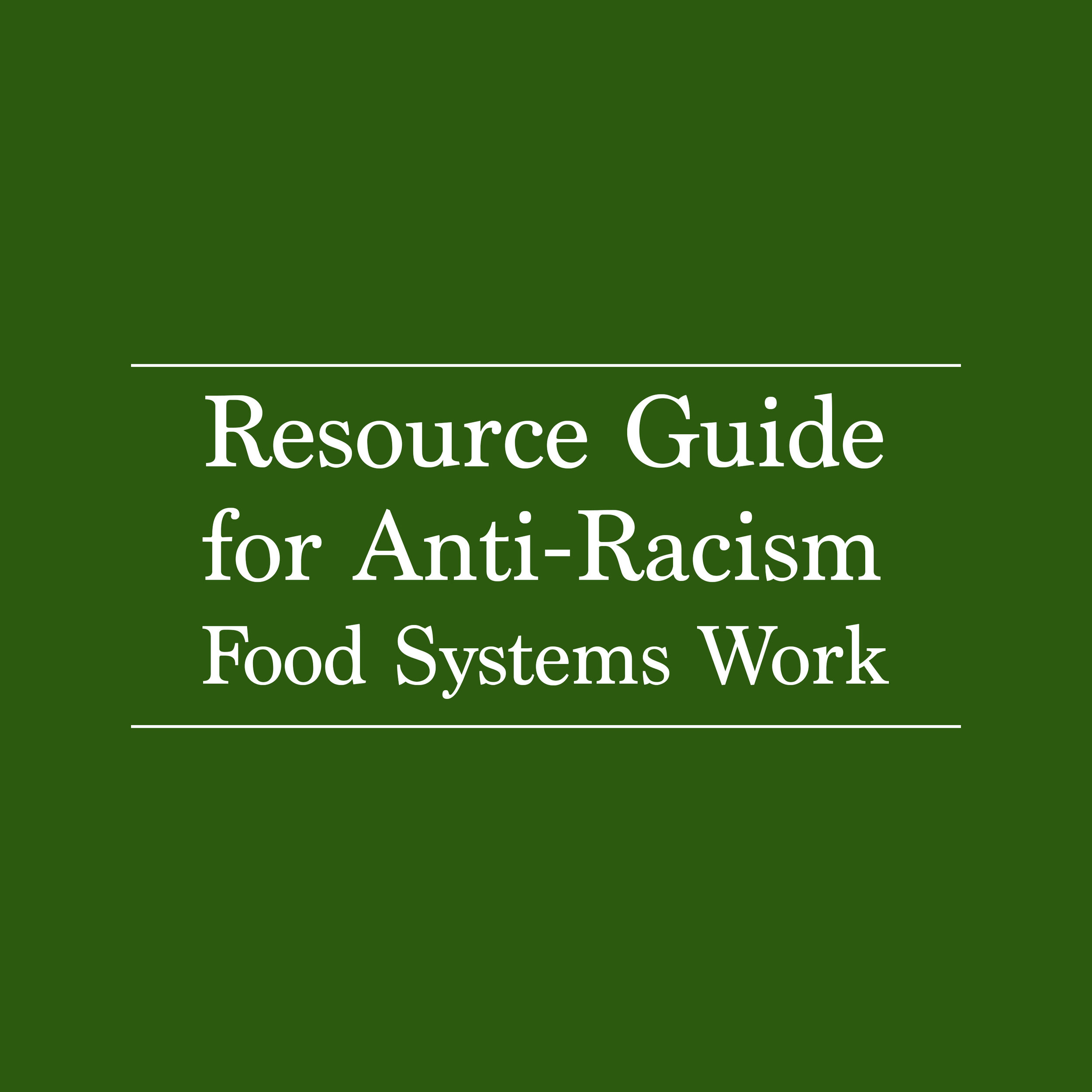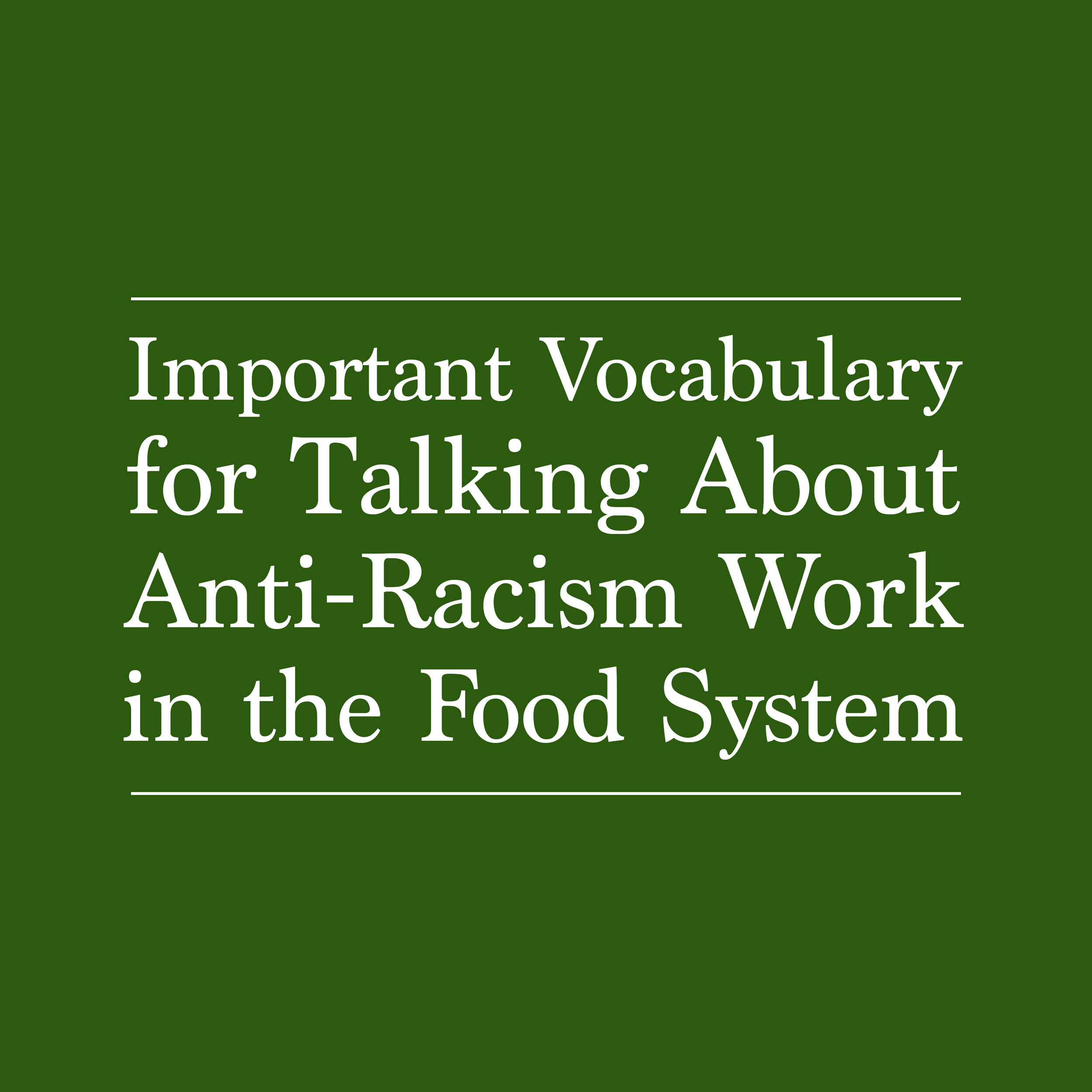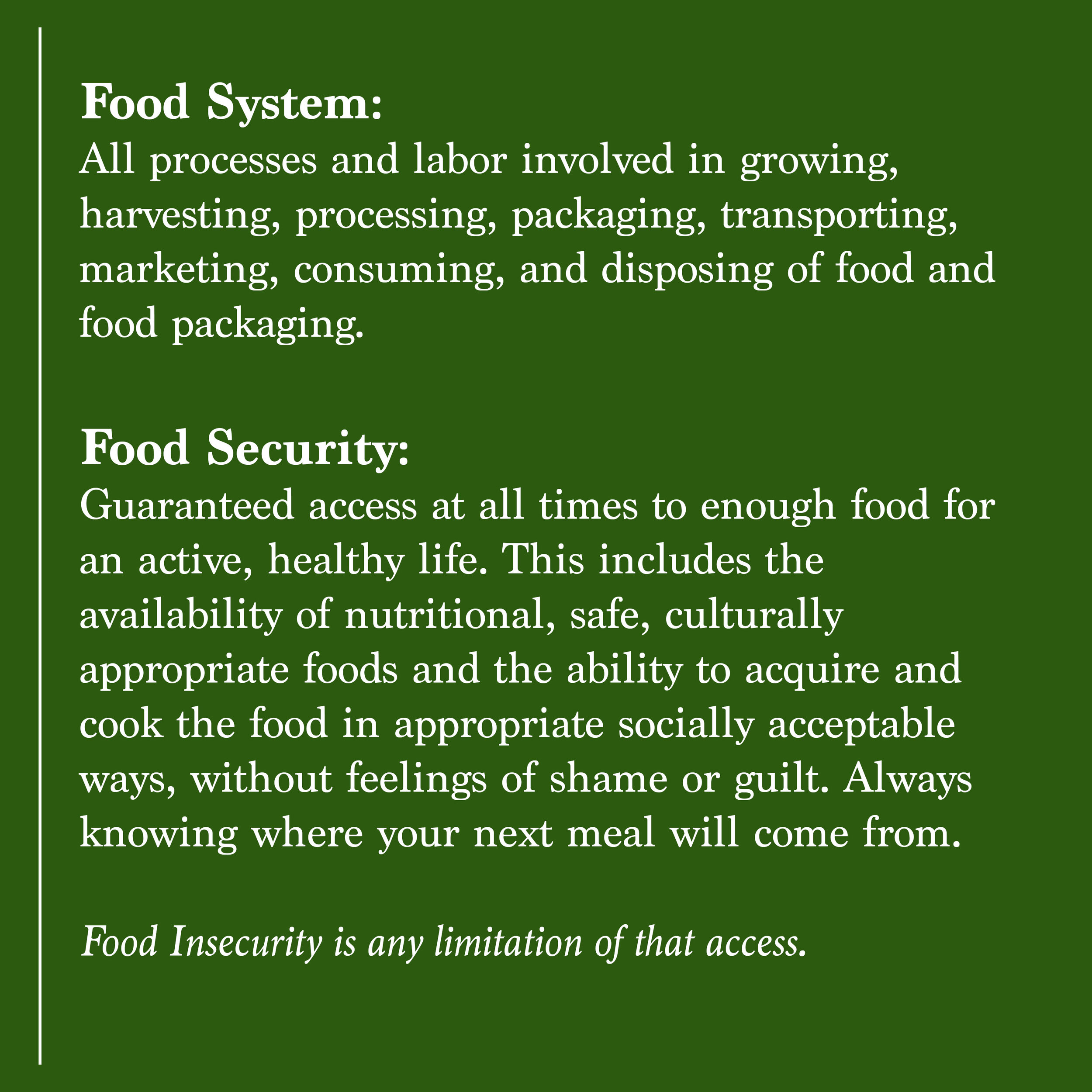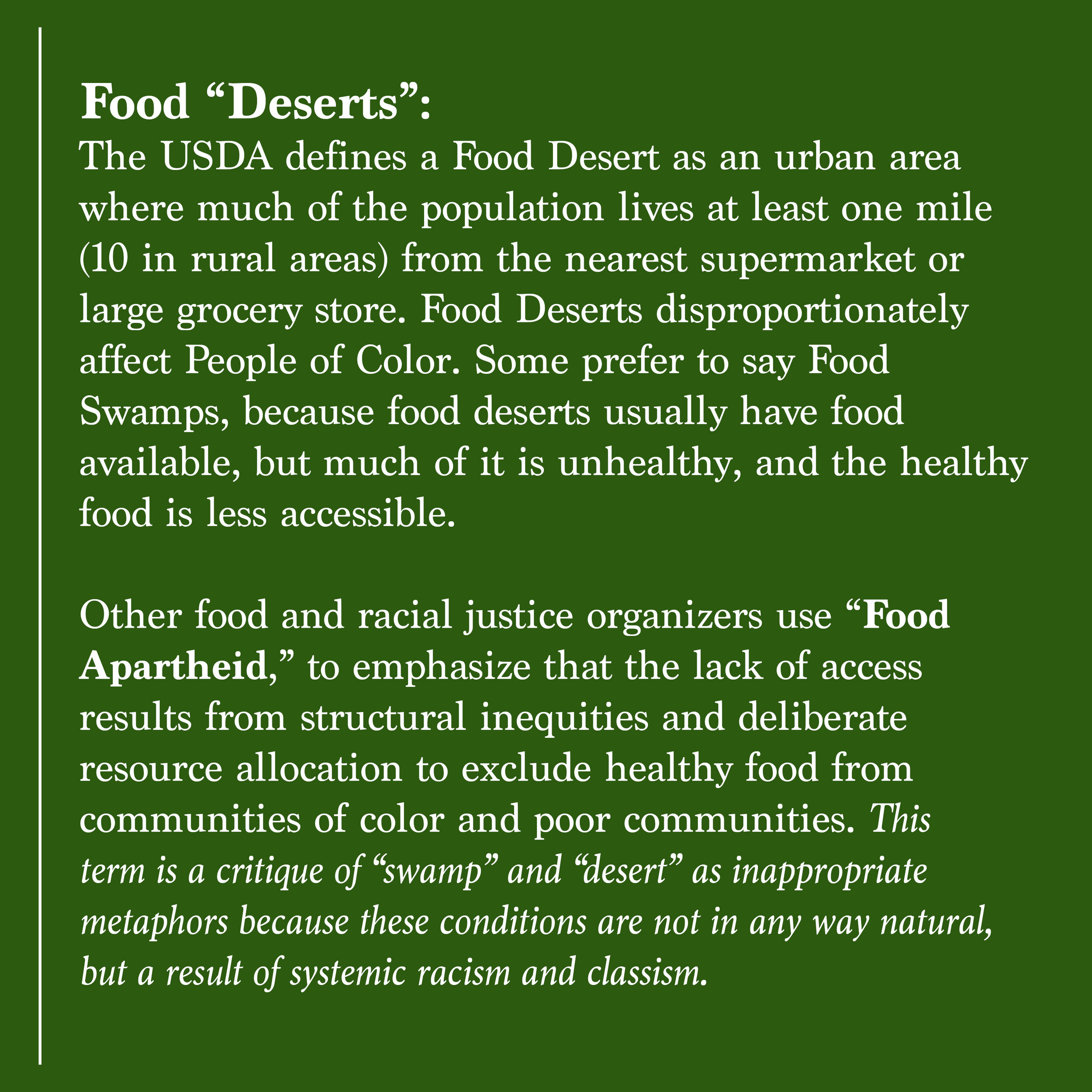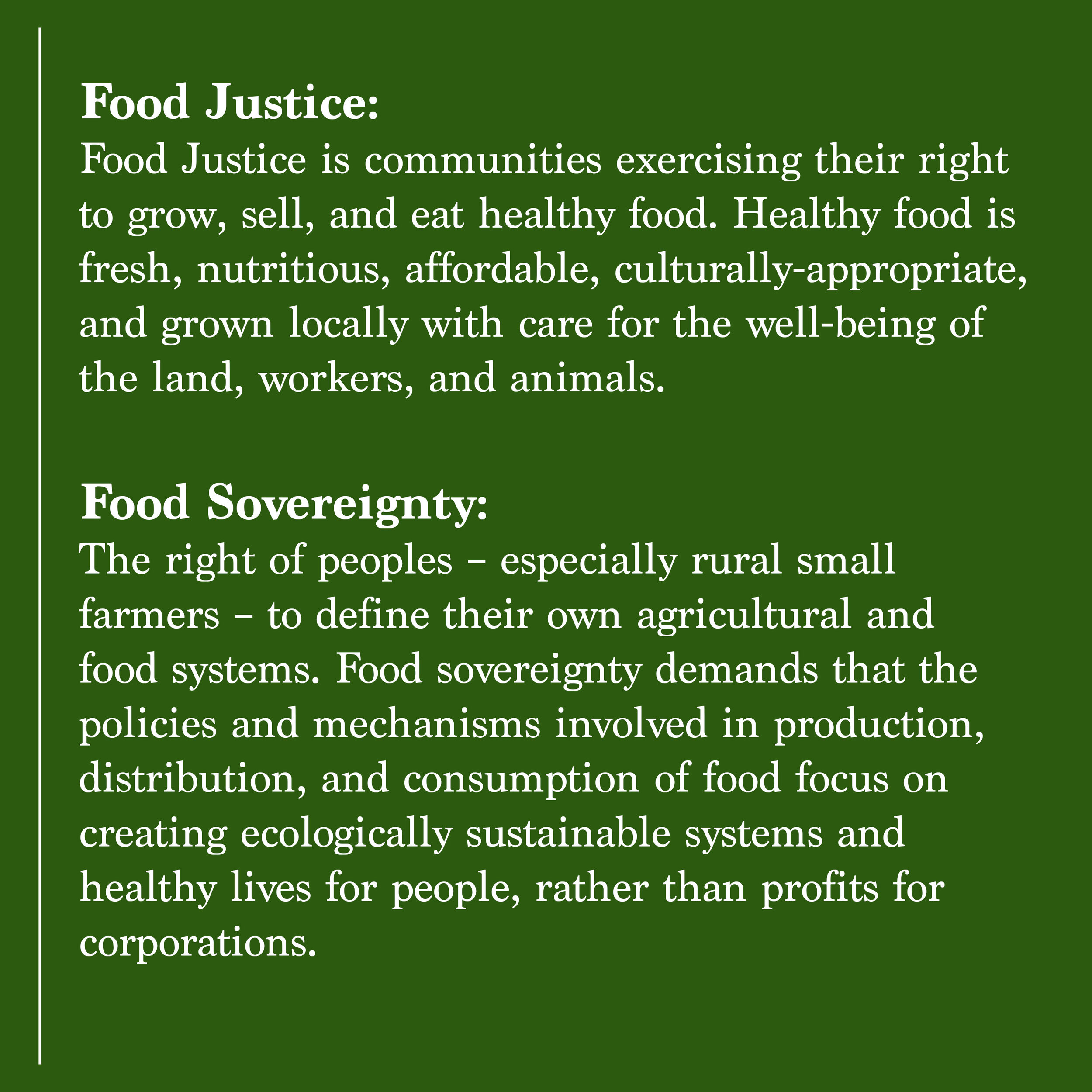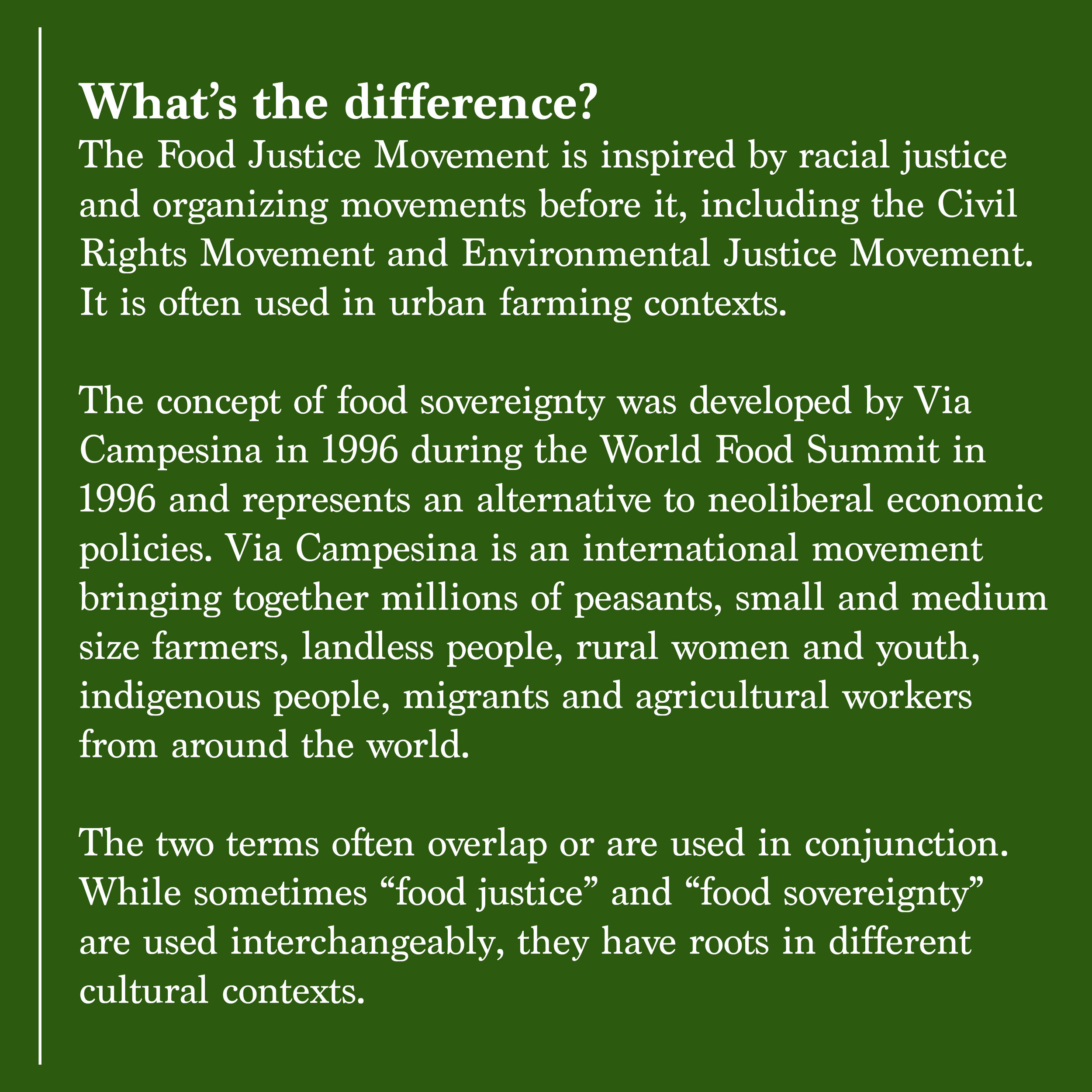Resource Guide for Anti-Racism Food Systems Work
Every week we’re sent amazing articles, books, podcasts and other content from our community. We love hearing from everyone and having these resources, and without the collective energy of everyone in this community we would not be able to collect resources and expand our perspectives beyond our own privilege. We have made the commitment to dedicate our work to justice in our food system, and we want to use our small platform to elevate the work that so many anti-racist food and agriculture organization are already doing in our country. Below you’ll find a collection of everything we’ve been sent over the past few days, weeks and months that we think you’ll find interesting and impactful. Grounded Grub is not claiming to lead the charge on anti-racist work in the food system. There are so many incredible individuals and organizations who are already doing this important work and we hope that we can amplify their voices so that our peers, particularly our white peers, can educate themselves and take action.
We hope you’ll use and share these resources to educate yourselves and start discussions in your community. Feel free to reach out to us if you have any questions or are looking for further resources.
While there are countless organizations to support during this time, we hope you’ll consider making a one-time or (even better!) a recurring donation to these organizations dedicated to supporting black farmers, Black land ownership, food justice and food sovereignty. We don’t want this to distract from the pressing issues of police reform and justice for Black lives, and we still hope you’ll donate to the list of organizations we posted earlier this week, but we do think this is an important step in continuing these efforts into the future, and we look forward to being a source of continued support of black-led efforts in the food system.
I was first unsure of how much I should donate to organizations, I live on an AmeriCorps stipend and have limited funds in savings. But what am I saving for in a world seeped injustice? I don’t want to live in that world so I am redirecting my funds towards the world I want to see.
This list is not inclusive of all the different amazing organizations that exist and are doing important work everyday. It is also not a stagnant collection of links. Please reach out if you think there’s anything we missed or anywhere we need to change how we have approached this resource list. We look forward to hearing from you.
For an even larger list of resources check out this Google Document. It includes organizations to donate to, Black chefs, food writers and historians to read, follow, and support, apps and websites to locate local black-owned restaurants and eateries near you, and a huge list of Black-owned restaurants organized by city.
Organizations to donate to:
Black Food Sovereignty Coalition (@blackfoodnw) | https://blackfoodnw.org/
Supporting black farmers in the Pacific Northwest; “BFSC serves as a collaboration hub for Black and Brown communities to confront the systemic barriers that make food, place and economic opportunities inaccessible to us”
Soul Fire Farm (@soulfirefarm) | http://www.soulfirefarm.org/
Soul Fire Farm is committed to uprooting racism in the food system by establishing and sustaining infrastructure focused on empowering, employing, educating, and feeding communities of color.
Black Dirt Farm Collective (@b_d_f_c) | https://www.facebook.com/blackdirtfarmcollective
“The Black Dirt Farm Collective is a collective of Black farmers, educators, scientists, agrarians, seed keepers, organizers, and researchers guiding a political education process. Through our cultivation of a Black agrarian education (Afroecology).”
National Black Food and Justice Alliance (@blackfoodjustice) | https://www.blackfoodjustice.org
“A coalition of Black-led organizations working towards cultivating and advancing Black leadership, building Black self-determination, Black institution building and organizing for food sovereignty, land and justice. The Alliance seeks to achieve this by engaging in broad based coalition organizing for black food and land, increasing visibility of Black led narratives and work, advancing Black led visions for just and sustainable communities, and building capacity for self-determination within our local, national, and international food systems and land rights work.”
The Northeast Farmers of Color Land Trust (@nefoclandtrust) | https://nefoclandtrust.org/
“NEFOC is working towards a collective vision of advancing land and food sovereignty in the northeast region through permanent and secure land tenure for POC farmers and land stewards who will use the land in a sacred manner that honors our ancestors dreams - for sustainable farming, human habitat, ceremony, native ecosystem restoration, and cultural preservation.”f
Harlem Grown (@harlemgrown) | http://www.harlemgrown.org/
Urban farm and education center with a mission “to inspire youth to lead healthy and ambitious lives through mentorship and hands-on education in urban farming, sustainability, and nutrition.”Youth Farm Project (@youthfarmproject) | http://www.youthfarmproject.org/
“Our mission is to empower youth from diverse social and economic backgrounds as integral participants in building equitable local food communities. YFP is dedicated to healing our food system through an anti-racist organizing lens by bringing together youth from diverse backgrounds to explore environmental and social injustice within the food system.”
Forty Acres & A Mule Project (@40acresproject) | https://40acresproject.com/
“Wisconsin-based restaurateur Adrian Lipscombe is raising money to purchase agricultural land. The land purchase will help guarantee farm-to-table resources for the food industry, serve to provide an outlet for Black foodways and establish a safe haven to secure the legacy of Black foodways.”
For the Culture Magazine (@fortheculturefoodmag) | https://www.fortheculturefoodmag.com/
“The biannual printed food magazine celebrates Black women in food and wine. The stories in For the Culture will be about Black women throughout the diaspora, written by Black women and photographed and illustrated by Black women. It will be the first magazine of its kind.”
The Black Farmer Fund (@blackfarmerfund) | https://www.blackfarmerfund.org/
“Black Farmer Fund (BFF) is an emerging community investment fund that invests in black food systems entrepreneurs in New York State. Beyond making investments in these communities, BFF also emphasizes in building financial and investment literacy and active involvement of the community when discussing and creating financing options”
Black Culinary Alliance (@bcaglobal) | https://bcaglobal.org/
This organization, founded as the Black Culinarian Alliance, works to advocate for Black people in the food and beverage industry, a demographic that has been largely left out of mid and upper management opportunities in the culinary sphere. Today, they work to “promote not only people of color but to increase diversity overall and develop women as industry leaders.”
Black Family Land Trust | http://www.bflt.org/
“The Black Family Land Trust is one of the nation’s only conservation land trust dedicated to the preservation and protection of African-American and other historically underserved landowners assets, utilizing the core principles of land conservation and land-based community economic development. BFLT provides families with the tools necessary to make informed, proactive decisions regarding their land and its use including their Wealth Retention and Asset Protection (WRAP) program.”
Black Urban Growers | https://www.blackurbangrowers.org/
“Black Urban Growers (BUGS) is an organization committed to building networks and community support for growers in both urban and rural settings. Through education and advocacy around food and farm issues, they nurture collective Black leadership to ensure they have a seat at the table. Check out their Facebook page for virtual events.”
Family Agriculture Resource Management Services (@f.a.r.m.s) | https://www.30000acres.org/
“FARMS is a legal nonprofit, committed to assisting Black farmers and landowners in retaining their land for the next generation.”
Federation of Southern Cooperatives/Land Assistance Fund (@federationofsoutherncoop) | https://www.federation.coop/
“A non-profit cooperative association of Black farmers, landowners, and cooperatives, with a primary membership base in the Southern States.”
HEAL Food Alliance (@healfoodalliance) | https://healfoodalliance.org/
“HEAL brings together groups from various sectors of movements for food and farm justice to grow community power, develop political leadership, and exposing and limiting corporate control of the food system.”
The Land Loss Prevention Project | https://www.landloss.org/
“The Land Loss Prevention Project responds to the unprecedented losses of Black-owned land in North Carolina by providing comprehensive legal services and technical support to financially distressed and limited resource farmers and landowners.”
The National Black Farmers Association | https://www.nationalblackfarmersassociation.org/
“The National Black Farmers Association is a non-profit organization representing African American farmers and their families in the United States.”
Southeastern African American Farmer’s Organic Network | http://saafon.org/
“SAAFON is a regional network for Black farmers committed to using ecologically sustainable practices to manage their land and the natural systems on it in order to grow food and raise livestock that are healthy for people and the planet.”
Other ways to support black food systems change makers:
Educate yourself. Read articles, take part in the 21-Day Racial Equity in the Food System Challenge (LINK), and amplify these stories via your own social networks. Systemic change starts in individual reflection, growth and dedication to checking individual white supremacy.
Purchase groceries from black-owned and operated farms. Consider subscribing to a CSA program and donate as well if you are able.
Purchase food from black-owned restaurants (and tip them generously!).
Purchase cookbooks by black authors from black-owned bookstores.
Media articles and videos:
The Unbearable Whiteness of Milk: Food Oppression and the USDA, Andrea Freeman, UC Irvine Law Review. This amazing piece brings together the social implications of food policy and how it has health impacts on our environment, our bodies and our communities. Don’t be afraid by the academic article format, it’s a captivating and quick read. Read this amazing piece here.
“Decolonize Your Diet: Notes Towards Decolonization” Catrióna Rueda Esquibel, Food First. The idea of cancer-fighting foods is not a new one—popular media is often dominated by the latest “food craze” to cure cancer, diabetes, Alzheimer’s, heart disease, and more. This Backgrounder is a brief introduction to the Decolonize Your Diet project and its role in a much larger movement to reclaim traditional foodways as a form of resistance to ongoing colonization. Read this impactful piece here.
Surviving Droughts, Tornadoes and Racism, James Estrin, The New York Times. “An African-American family has established a farming dynasty in Alabama. The trade war is just the latest challenge… The Bridgeforth farm has been in family hands for a century and a half, defying forces that drove most black farmers off their land.” Read the full article here.
Racial Equity Toolkit from the Young Farmers Coalition, While this resource will be mostly relevant for white farmers and organizers, many of the concepts and analyses of racial dynamics in the reading are relevant for anyone interested in learning how to be a better ally. Find the full toolkit here.
Leveling the Fields: Creating Farming Opportunities for Black People, Indigenous People, and Other People of Color, Union of Concerned Scientists and HEAL Food Alliance. Farming offers a powerful path to build community wealth and resilience to challenges such as water pollution, droughts and floods, and lack of access to healthy food. However, US agriculture—particularly the pursuit of sustainable agriculture—is rife with obstacles for Black people, Indigenous people, and other people of color (BIPOC), including immigrants, migrants, and refugees. To begin overcoming the history of racist policies and exclusion, it is our primary recommendation that solutions be developed by and with—rather than for—Black people, Indigenous people, and other people of color. Read the policy brief here.
The Difference Between Yams and Sweet Potatoes Is Structural Racism. Maragret Eby, Food & Wine. “The confusion goes all the way back to the Trans-Atlantic slave trade.” Read this amazing article here. Thank you for sharing this piece, Paige Crenshaw!
When McDonalds was a Road to Black Liberation. Gene Demby. National Public Radio. “Chatelain, a historian at Georgetown and host of The Waves podcast at Slate, outlines a forgotten history of the fast-food behemoth's rapid expansion into black America in the post-civil rights world.” Read this interesting piece here.
Racism: From Mistreatment to Transformation. Eric Holt-Gimenez and Breeze Harper, Food First. This piece offers a macroscopic view of racism in our current and historical food systems, and how it has come to mold the current state of our food system in totality. Check it out here.
Leaders of Color Discuss Structural Racism and White Privilege in the Food System. Food First. As a compilation of quotes from leaders of color regarding the aforementioned issues, this piece offers a series of incredibly powerful perspectives and words on the depth, breadth, historical and modern impacts of structural racism and white privilege. Check out this amazing piece here.
How Racism Has Shaped the American Farming Landscape. Megan Horst, Eater. “U.S. agriculture today appears to be just as segregated as it was a century ago, with farmers of color at a significant disadvantage.” This article unpacks a bit of the history and continued institutional racism that has left farmers of color at a significant disadvantage in the US. Read this piece here.
Capitalism and Racism: Conjoined Twins. Marjona Jones, Neighborhood Funders Group. “…exposing capitalism for what it is forces it to transform and evolve. For example, following the Emancipation Proclamation of 1863, agriculture was still the main economic engine, and free exploited labor was needed for this industry to survive. Capitalism evolved while maintaining its racist and exploitative roots through policymakers passing the Black Codes of 1865 and 1866, making it easier to imprison recently freed slaves to continue that supply of free labor. We are catching up to the fact that capitalism was never meant to work for everyone. What will the next evolution in capitalism bring as our movements fight even harder for racial and economic justice in the face of harm to workers and marginalized communities?” Read this moving piece here.
Growing Justice: Transcending Racism in the Food System. Michelle Stearn, The Next System Project. “Marvin Brown’s Civic Economy of Provisions asks us to delve deep into the depths of our economic system’s history. Only then, he posits, will we be able to transform a structure based wholly in the violent exploitation and dehumanization of African people from the times of the trans-Atlantic slave trade to our current moment in history. We zoomed in on the food system, an industry that illustrates both the dark ironies of the global economy’s roots in slavery and exploitation, but also opportunities for a true departure from the current paradigm that—by design—oppresses the livelihoods of the individuals that make up the Black community.” Read this piece here.
Stop Comparing Black Lives Matter to Animal Rights, Summer Anne Burton. “Even the most radical, abolitionist, anti-speciesist non-Black vegan should resist the urge to ever make a comparison between the Black Lives Matter movement and animal rights. Why? The reasons why are multiple, but let me start with the most basic: You already enjoy the opportunities and privileges that Black people are fighting for. You are an observer of oppression, not the oppressed.” Read more here.
Looking for more literature on these issues? Check out this huge annotated bibliography full of resources regarding structural racism in the US Food System.
Books:
Farming While Black: Soul Fire Farm's Practical Guide to Liberation on the Land - Leah Penniman
Sistah Vegan - A. Breeze Harper
Freedom Farmers - Monica M. White
The Next American Revolution: Sustainable Activism for the Twenty-First Century - Grace Lee Boggs
Notes from a Young Black Chef - Kwame Onwuachi
Black, White, and Green: Farmers Markets, Race, and the Green Economy - Alison Hope Alkon
Black Food Geographies by Ashanté M. Reese
Podcasts:
Flipping the Table. Link here.
The Secret Ingredient. Link here.
Losing Ground — Reveal from the Center for Investigative Reporting. Link here.
All of the 20 Food Podcasts by Black Women (compiled by soulPhoodie)
This list is not inclusive of all the different amazing organizations that exist and are doing important work everyday. Please reach out if you think there’s anything we missed or anywhere we need to change how we have approached this resource list. We look forward to hearing from you.
For an even larger list of resources check out this Google Document. It includes organizations to donate to, black chefs, food writers and historians to read, follow, and support, Apps and Websites to locate local black-owned restaurants and eateries near you, and a huge list of black-owned restaurants organized by city.
This list would have been impossible without the important contributions of Paige Crenshaw, Eleanor Williams, Eva Kahn and Kiara Kashuba.
